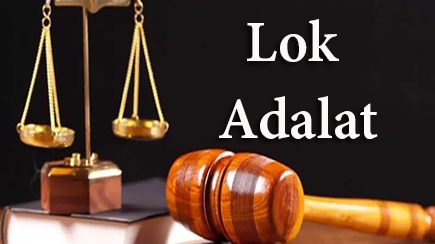Description

Copyright infringement not intended
In News
- National Lok Adalat has settled over 74 lakh pending and pre-litigation cases across the country.
- The total value of the settlement amount is nearly Rs 5,039 crore.
- The legal services authorities under the Chief Justice of India, who is also the executive chairman of the National Legal Services Authority (NALSA) have conducted ‘digital lok adalat’ in Maharashtra and Rajasthan.
LOK ADALATS
- The Lok Adalat is a platform where the cases (or disputes) which are pending before a court or which are at the pre-litigation stage (not yet brought before a court) are compromised or settled in an agreeable manner.
- The ‘Lok Adalat’ is one of the components of the ADR (Alternative Dispute Resolution) system.
- Indian courts are overburdened with a backlog of cases and the regular courts are to decide the cases involving a lengthy, expensive and tedious procedure.
- Lok Adalat provides alternative resolutions for expeditious and inexpensive justice.
- Lok Adalat is an alternate mode of dispute settlement that has come to be accepted as a viable, economic, efficient and informal one.
Background
- The first Lok Adalat camp was organised in Gujarat in 1982. This initiative proved very successful in the settlement of disputes.
- The institution of Lok Adalat started spreading to other parts of the country.
- At that time, this institution was functioning as a voluntary and conciliatory agency without any statutory backing for its decisions.
- The institution of Lok Adalat has been given statutory status under the Legal Services Authorities Act, 1987.

Key Points of the Legal Services Authorities Act, 1987
- The State Legal Services Authority or the District Legal Services Authority or the Supreme Court Legal Services Committee or the High Court Legal Services Committee or the Taluk Legal Services Committee may organise Lok Adalats at such intervals and in such areas as it thinks fit.
- Every Lok Adalat organised for an area shall consist of such a number of serving or retired judicial officers and other persons of the area as may be specified by the agency organizing such Lok Adalat.
- Generally, a Lok Adalat consists of a judicial officer as the chairman and a lawyer (advocate) and a social worker as members.
- A Lok Adalat shall have jurisdiction to determine and to arrive at a compromise or settlement between the parties to a dispute in respect of:
- Any case pending before any court.
- Any matter which is falling within the jurisdiction of any court and is not brought before such court.
- The Lok Adalat can deal with various matters such as;
- Matrimonial/Family Disputes.
- Criminal (Compoundable Offences) cases.
- Land Acquisition cases.
- Labour disputes, Workmen’s compensation cases.
- Bank Recovery cases.
- Pension cases.
- Housing Board and Slum Clearance cases.
- Housing Finance cases.
- Consumer Grievance cases, Electricity matters.
- Disputes relating to Telephone Bills, Municipal matters including House Tax cases, Disputes with Cellular Companies etc.
- The Lok Adalat shall have no jurisdiction in respect of any case or matter relating to an offence not compoundable under any law.
- The offences which are non-compoundable under any law fall outside the purview of the Lok Adalat.
- Any case pending before the court can be referred to the Lok Adalat for settlement if:
- The parties thereof agree to settle the dispute in the Lok Adalat.
- One of the parties thereof makes an application to the court referring the case to the Lok Adalat.
- The court is satisfied that the matter is an appropriate one to take cognizance of by the Lok Adalat.
- In the case of a pre-litigation dispute, the matter can be referred to the Lok Adalat for settlement by the agency organizing the Lok Adalat, on receipt of an application from any one of the parties to the dispute.
- The Lok Adalat shall have the same powers as are vested in a Civil Court under the Code of Civil Procedure (1908).
- An award of a Lok Adalat shall be deemed to be a statute of a Civil Court or an order of any other court.
- Every award made by a Lok Adalat shall be final and binding on all the parties to the dispute.
- No appeal shall lie to any court against the award of the Lok Adalat.
Significance of Lok Adalat
- There is no court fee and if the court fee is already paid the amount will be refunded if the dispute is settled at Lok Adalat.
- The basic features of Lok Adalat are procedural flexibility and speedy trial of disputes.
- There is no strict application of procedural laws like the Civil Procedure Code and the Evidence Act while assessing the claim by Lok Adalat.
- The parties to the dispute can directly interact with the judge through their counsel which is not possible in regular courts of law.
- The award by the Lok Adalat is binding on the parties and it has the status of a statute of a civil court and it is non-appealable, which does not cause a delay in the settlement of disputes finally.
- Lok Adalats are a boon to the litigating public as they can get their disputes settled fast and free of cost and amicably.
- It is less expensive and less time-consuming.
- It is free from technicalities vis-a-vis conducting cases in law courts.
- Parties are free to discuss their differences of opinion without any fear of disclosure before any law courts.
- Parties have the feeling that there is no losing or winning side between them but at the same time their grievance is redressed and their relationship is restored.
https://epaper.thehindu.com/Home/ShareArticle?OrgId=GCKA5DR57.1&imageview=0
https://t.me/+hJqMV1O0se03Njk9















